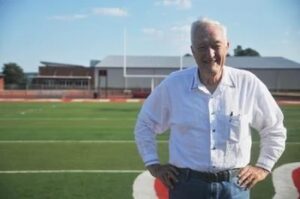
Wilbanks K. Smith
*Wilbanks K. Smith was born on this date in 1930. He was a white-American college football player from Mangum, Greer County, Oklahoma.
In 1951, two brutal hits by Smith in a football game at Oklahoma A&M on Johnny Bright broke the Drake star running back's jaw. Called the Johnny Bright Incident, the Des Moines Register captured the blows on film and won a Pulitzer Prize. Fifty-five years later, Wilbanks Smith still doesn't regret hitting Johnny Bright. However, Smith does regret that everyone thinks the blow was racially motivated. Berry Tramel of the Oklahoman newspaper wrote about the Johnny Bright incident in 2006.
Over the years, the story has been chronicled as racially motivated: Smith popped Bright because he was black. But Smith, years later, living in Humble, Texas, says race had nothing to do with it. "All my life, I never understood where this came from, Smith said. Smith said, on the first play of the game, he delivered an identical blow to Drake's kicker, who was absolutely white."
Smith also said that his blow to the head with a forearm was legal at the time, and the rule was changed in 1952, primarily because of the Bright injury. "I'd be the first to say the regulations should have been there, Smith said. "It became obvious later in football that you didn't need to be hitting people in the head. Those rules should have changed back in the '40s." Oklahoma research did not support Smith's recollection of the rules. In 1932, college football instituted a rule that forbade defenders from striking opponents in the head, neck, or face.
In 1952, the league changed the penalty for striking with a forearm, elbow, locked hands, or flagrantly rough play or unsportsmanlike conduct from 15 yards to 15 yards and a mandatory suspension. So, Smith's hit on Bright should have been penalized under the rules of the day, but did not warrant ejection from the game. Football was a rough sport back then, with far less padding than is used today. However, even in the 21st century, jaws are often left uncovered. Smith said that after the publicity of the Bright incident, "I was scared to death. He received a lot of mail. "Forty-five percent thought they should shoot me; 45 percent said stuff like I can go to Arkansas, and they'd elect me governor ... I wanted the whole thing to go away."
Wilbanks was also a musician who played the piano and the guitar. He was an engineer for EXXON. Wilbanks Smith died on January 14, 2020 (aged 89).